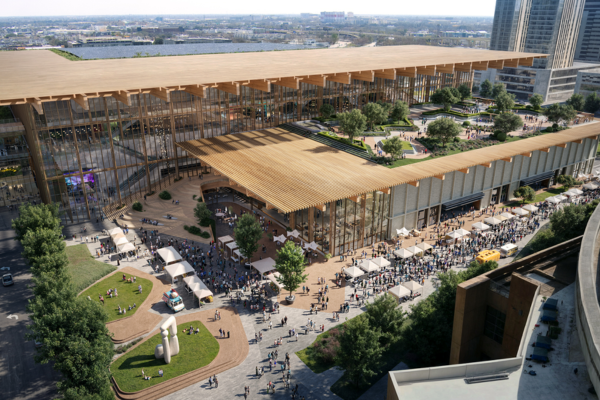Greater Houston Partnership Supports $3.5 Billion METRO Bond Election
Published Aug 22, 2019 by A.J. Mistretta
HOUSTON – On Wednesday, August 21, the board of directors of the Greater Houston Partnership, the region’s leading economic development and business organization, voted to support the ballot item on the November 5, 2019 general election authorizing the Metropolitan Transit Authority of Harris County (METRO) to issue up to $3.5 billion in bonds to finance the implementation of a subset of projects contained in its METRONext plan.
In the months before the board’s vote, the Partnership’s Transportation Advisory Committee, chaired by Mark Cover, CEO Southwest Region at Hines, and vice chaired by Walt Mischer, partner at Mischer Investments, studied the proposed routes and services, ridership projections, cash-flow analyses, and transit modeling forecasts.
In particular, the committee worked to ensure the plan was fiscally responsible, contains a proper multi-modal balance, includes the flexibility to adapt to technological advancements, and structured in a manner that is responsive to the future availability of matching funds and the feasibility of implementation.
Combined with a potential match of $3.5 billion in federal funds and $500 million in other available local funds, the $3.5 billion bond will allow for up to $7.5 billion in transit network development – projects, that according to the Partnership, will be crucial for the growth and mobility demands of the Houston region for the next several decades.
“We thank METRO officials for their willingness to sit down with us to discuss the bond proposal and the METRONext plan,” said Mark Cover. “The ability of Houstonians to more efficiently move around our region is essential to our continued economic success – both for our businesses and our employees and their families. The METRONext plan directs our transit plans between now and 2040. It is critical that we get this right, and I think we are on a good path.”
The plan includes 75 miles of bus rapid transit (BRT) service, called METRORAPID, connecting major business districts along with George Bush Intercontinental Airport. BRT projects are expanding around the world for their more cost-efficient, high-speed movement of riders when compared to other modes of public transportation.
In addition, the plan calls for approximately 110 miles of new or improved HOV lanes to support regional express bus service and carpooling. The funds will also be used to upgrade Park & Ride facilities across the region and enhance service on 16 of the region’s most frequently travelled routes.
The committee was pleased with the transit authority’s decision to modify the original light rail plan that proposed to extend both the Purple and Green lines to Hobby. Instead, the new plan connects the two lines and looks to a future extension of a single line to Hobby. This modification resulted in $350-400 million in savings that will be reallocated to enhance other services that will benefit the broader community.
The Partnership’s Transportation Advisory Committee worked to understand the significant cost differences between developing BRT and other services compared to extending light rail service. The Committee’s discussions with METRO stressed the importance of maximizing efficiencies to focus on serving the broader community.
“When taken in its entirety, the METRONext plan will help keep our region moving,” said Walt Mischer, “We appreciate the importance they have placed on maintaining fiscally responsible practices while enhancing mobility. We are pleased to support the projects and the funding package to bring them into reality.”
Registered voters within the METRO service area, which includes 14 cities in the region and major portions of unincorporated Harris County, will vote on the bond item as part of the November 5, 2019 general election.
The ballot item will also include the continuation of the General Mobility Program (GMP) through 2040, which is funded by a 25 percent allocation from METRO's one percent sales tax revenue. The GMP provides funds for the construction and maintenance of transportation infrastructure and related drainage improvements throughout the City of Houston, Harris County and 14 surrounding local jurisdictions. The GMP has provided approximately $180 million in FY 2019 and $3.2 billion since the program’s inception. It's estimated to contribute an additional $5.4 billion through 2040.
Greater Houston Partnership
The Greater Houston Partnership works to make Houston one of the best places to live, work and build a business. As the economic development organization for the region, the Partnership champions growth across 11 counties by bringing together business and civic-minded leaders who are dedicated to the area’s long-term success. Representing more than 1,000 member organizations and approximately one-fifth of the region’s workforce, the Partnership is the place companies come together to make an impact. Learn more at Houston.org.
CONTACT: A.J. Mistretta Maggie Martin
(o) 713-844-3664 (o) 713-844-3640
(c) 504-450-3516 mmartin@houston.org
amistretta@houston.org
 Press Releases
Press Releases



















